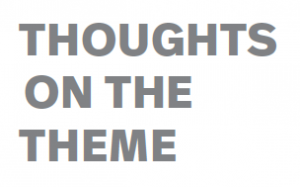
It wouldn’t be our style to have an entire issue, even a February one, devoted to flowers and Valentines, but if you look closely, love is a major player in this issue. But before we go there, here’s a question: what do the Paycheck Protection Program, equity for black and brown farmers, clearcutting in forests and governmental cronyism have in common? Way too much, unfortunately.
We all know at least one favorite establishment that closed during the pandemic, unable to meet payroll or pay the rent or purchase product. The government’s assistance program, PPP, promised to help stem the hemorrhaging. But now we’ve learned those payments, more often than not, didn’t reach the small businesses and households that needed them the most. As Dan Leahy reports on page 11, more than 75% of PPP business loans went to owners and shareholders whose enterprises would likely have survived without the payments. And while a sizeable portion of payments to families went to the lowest earners, over 70% were awarded to households in the highest income bracket.
Farming assistance programs likewise say one of their goals is to level the playing field, in this instance for people who’ve historically been excluded from land stewardship and ownership. The question is why do programs that pay lip service to change so rarely deliver it? As Mercy McGee writes on page 6, no amount of inclusive language will translate into more farmers of color if it isn’t backed up with accessibility, funding, and other tools for implementation. Until that happens, it’s just the same old story on a different day.
Whose heart doesn’t break a little when a logging truck full of giant tree carcasses drives by on its way to the mill? We know beyond question that old growth trees are vital to the survival of the ecosphere, securing carbon deep in the soil and providing vital diversity of plant and animal kingdoms. We also know that replanting just one species—monocropping—leaves a young forest vulnerable to disease and drought (and therefore, fire). Why are we still allowing the last of them—on public land, no less—to be sold off by a government entity taking its cues from the timber industry?
We also know elected officials shouldn’t make decisions about public land if they stand to benefit personally from those deals. They shouldn’t probably be in those positions at all, right? This time it’s not just us saying it—read the story on page 1 and the letter to the editor on page 3.
We’ve devoted plenty of ink to vexing problems in this issue. But we also promised you some love. That part’s easy. What else prompts a person to testify before lawmakers on behalf of our fellow elders, the old growth trees? To go to bat again and again for the planet? What else compels a shy writer to speak on behalf of the grandmothers in her apartment complex? What else but love keeps a farmer on her land and still gives her the energy to advocate for her brothers and sisters?
Surely it was love that led three white men to Alabama in 1965 to march in solidarity with Black Americans, and something akin to love that prompted them to record and save their memories of that powerful time. What compels people to dig plants out of their yard to help kids go to college if it isn’t love, for crying out loud?
Okay, maybe some of that stuff was born as much from frustration as from love. Fair enough. But something keeps us in the fight. Something there is that doesn’t love a clearcut, or an evicted elder, or a land-poor farmer. We can change that. In the name of love.
P.S. Incredible news! As this issue went to press, we learned the Department of Natural Resources had paused the Upper Rusatz timber sale. The centuries-old forest near Nooksack River in Whatcom County isn’t out of the woods yet, so to speak, but the reprieve does suggest Lands Commissioner Hillary Franz is serious about the DNR’s plans to review their policies concerning older forests.
The DNR also recently rescheduled their decision on another “nearly old growth” stand known as the Bessie Timber Sale. But as Rob Lewis writes in a guest opinion piece in the Cascadia Daily News, if the DNR is truly revising their policies to protect the trees, why are these two stands still being considered for timber sales? “Is this an oversight or is DNR rushing these sales to get them to auction before the policy review?”
Alexander Harris of the Center for Responsible Forestry says the vote will probably be rescheduled for March 1. You know what that means. Call the DNR. Write them an old-fashioned letter. Circulate the Keep Washington Evergreen document we reference on the back page. And be sure to sign the petitions below and share them on your social media platforms.
Upper Rusatz petition
Bessie petition
Happy Valentine’s Day from all of us at Works in Progress!
—LL
About The Cover
Photos throughout this issue and on the front and back cover appear courtesy of the Forest Legacy Project. Quotations, unless otherwise noted, are taken from Keep Washington Evergreen, a record of testimony asking lawmakers to revise HB 1895, scheduled for vote on February 1, 2022, to provide significantly more protection for carbon-sequestering old-growth trees and the removal of undue language influenced by a thriving timber industry.
Among those testifying were the Chair for the State Forests Committee for Sierra Club’s Washington chapter, Director of the Washington Forest Law Center, representatives from 350 Seattle, a grassroots climate advocacy organization, the Issue Chair on Forests for the League of Women’s Voters in Washington, tree farmers, residents of Whatcom, Mason, Thurston and Clallam Counties, professional conservationists and climate justice activists. All sounded the alarm to stop the sale of the state’s last old growth forest.
To view a pdf of Keep Washington Evergreen, go to http://tinyurl.com/2p8a7dj2. Learn more at http://www.facebook.com/LegacyForestProject.
Be First to Comment